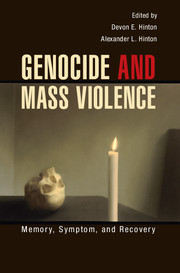Book contents
- Frontmatter
- Contents
- List of Figures
- List of Tables
- List of Contributors
- Foreword: What Does Trauma Do?
- Acknowledgments
- Introduction An Anthropology of the Effects of Genocide and Mass Violence
- Part I Private and Public Memory
- 1 The Vietnam War Traumas
- 2 Haunted by Aceh
- 3 Remembering and Ill Health in Postinvasion Kuwait
- 4 “Behaves Like a Rooster and Cries Like a [Four Eyed] Canine”
- 5 Embodying the Distant Past
- 6 Half Disciplined Chaos
- Part II Symptom and Syndrome
- Part III Response and Recovery
- Index
- References
6 - Half Disciplined Chaos
Thoughts on Destiny, Contingency, Story, and Trauma
Published online by Cambridge University Press: 05 November 2014
- Frontmatter
- Contents
- List of Figures
- List of Tables
- List of Contributors
- Foreword: What Does Trauma Do?
- Acknowledgments
- Introduction An Anthropology of the Effects of Genocide and Mass Violence
- Part I Private and Public Memory
- 1 The Vietnam War Traumas
- 2 Haunted by Aceh
- 3 Remembering and Ill Health in Postinvasion Kuwait
- 4 “Behaves Like a Rooster and Cries Like a [Four Eyed] Canine”
- 5 Embodying the Distant Past
- 6 Half Disciplined Chaos
- Part II Symptom and Syndrome
- Part III Response and Recovery
- Index
- References
Summary
The career of this stubborn adventurer signally illustrates the idea that since all human affairs are subject to organic disorder; since they are created in, and sustained by, a sort of half disciplined chaos; hence, he who in great things seeks success, must never wait for smooth water; which never was, and never will be; but with what straggling method he can dash with all his derangements at his object, leaving the rest to Fortune.
– Herman Melville (Israel Potter, 1985, p. 555)“Half Disciplined Chaos” is divided into two parts. The first is a theoretical alert, if I may use that expression, for calling attention to a domain of human experience – the contingent – that has not received the attention it deserves in psychiatric anthropology, in anthropology generally. The second is concerned with how the articulation of contingency figures in the response to drastic misfortune, a wound, which we all too readily describe as trauma and embed in our psychological understanding. I will discuss the role notions of destiny, fate, and chance play in the lives of the Harkis – those Algerians, Berbers and Arabs alike, around 250,000, who sided with the French during the Algerian War of Independence (1954 to 1962). Tens of thousands were brutally slaughtered at the war’s end by an angered Algerian population. Those who managed to escape to France, despite the opposition of the Gaullist government, were incarcerated, some for sixteen years, in camps and forestry hamlets.
I am particularly interested in the passage of the wound from generation to generation. I suggest that the Harkis’ sense of destiny mediates their experience of the war and its aftermath in a way that is quite different from that of their children. Raised in France, the children have lost their parents’ sense of destiny and the solace it offers them. They live in the “modern” world of luck and chance, in which the unexpected, as Anthony Giddens (1990, pp. 29–31) observes, “is thought to come from risk rather than the intervention of fate or the divine.” They assume their parents’ wounds, which, at a remove, often displace their conflicted relationship with them and their ambivalence toward France. As such, the wound becomes a trauma for them.
- Type
- Chapter
- Information
- Genocide and Mass ViolenceMemory, Symptom, and Recovery, pp. 157 - 172Publisher: Cambridge University PressPrint publication year: 2014
References
- 3
- Cited by



